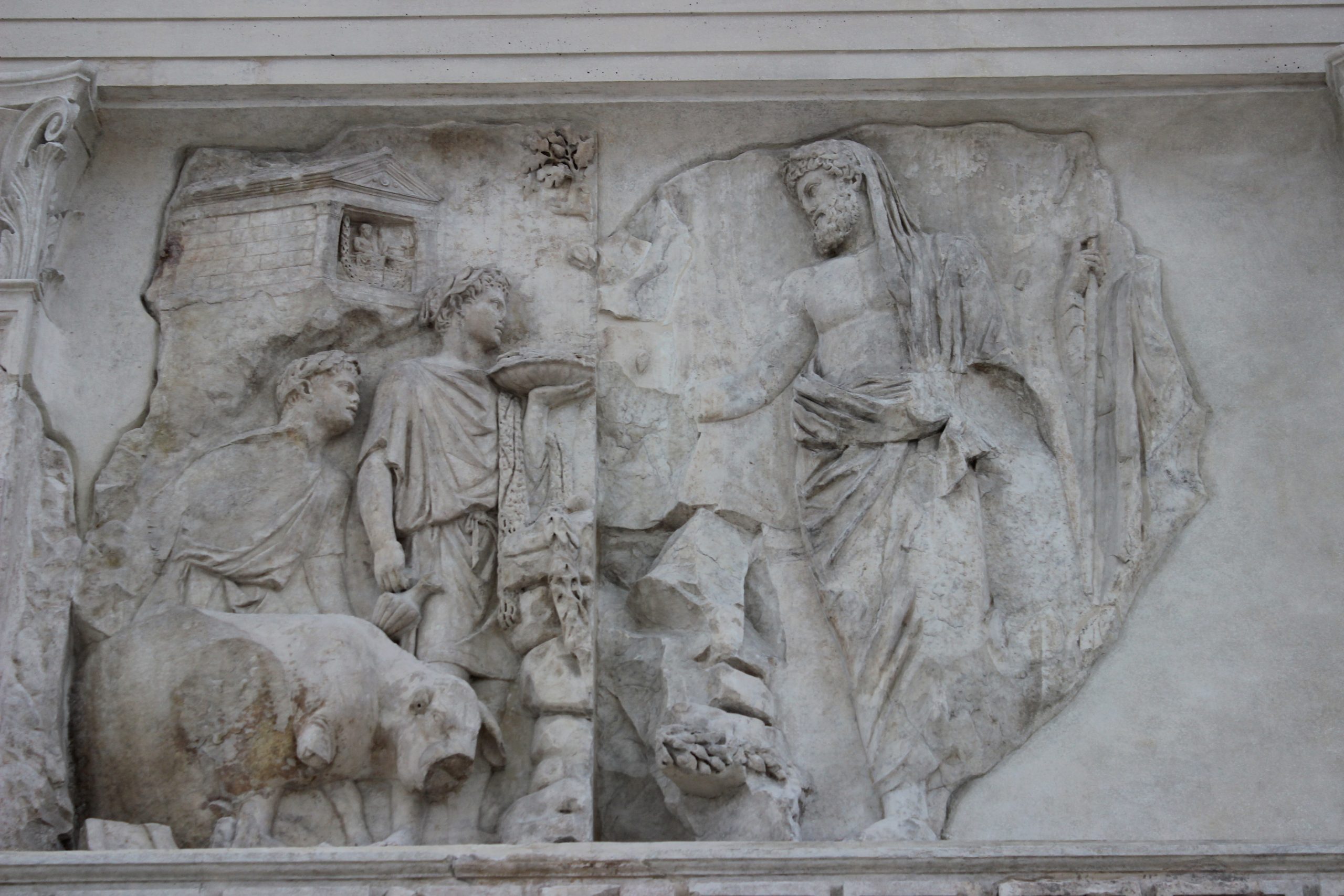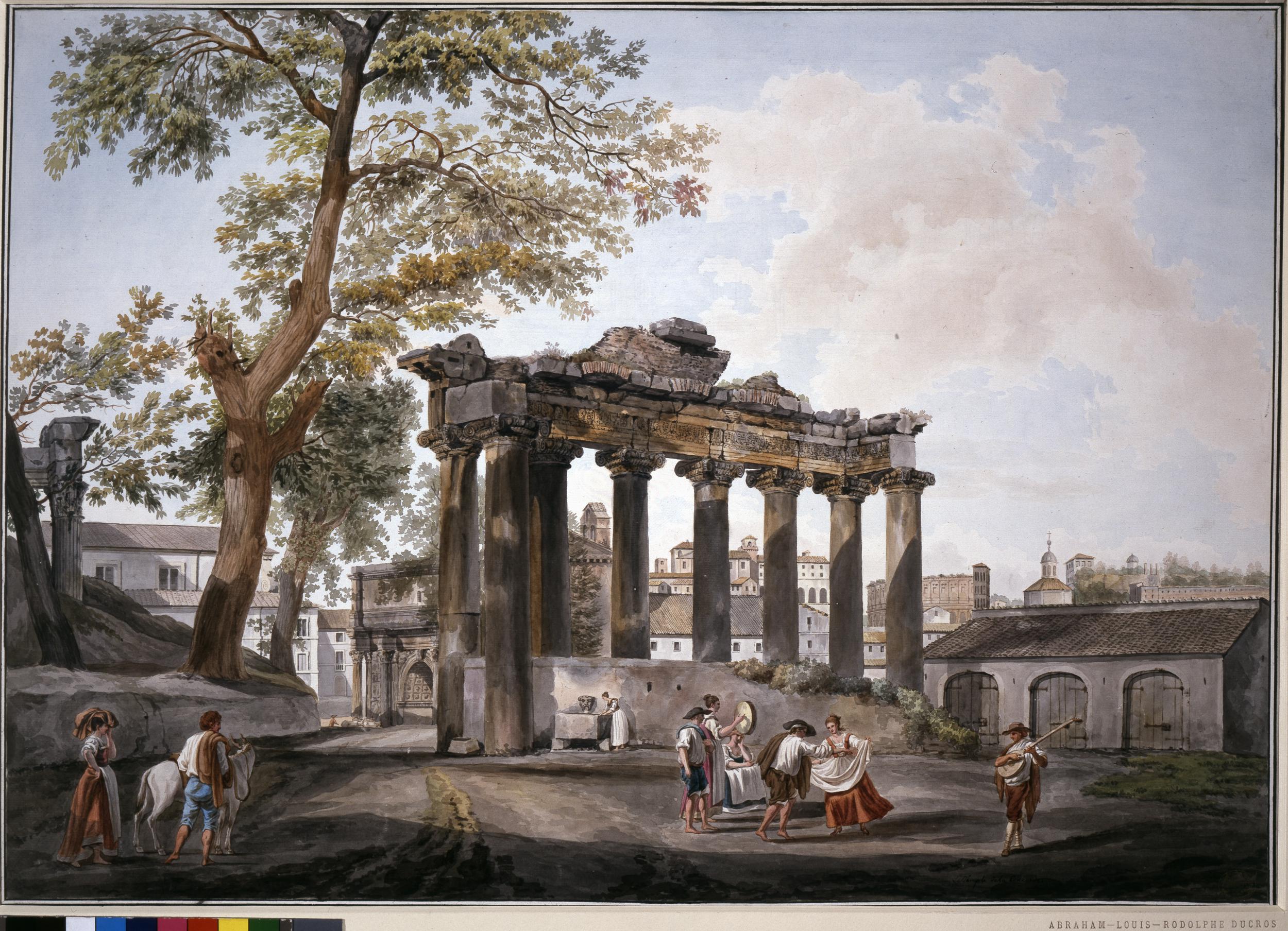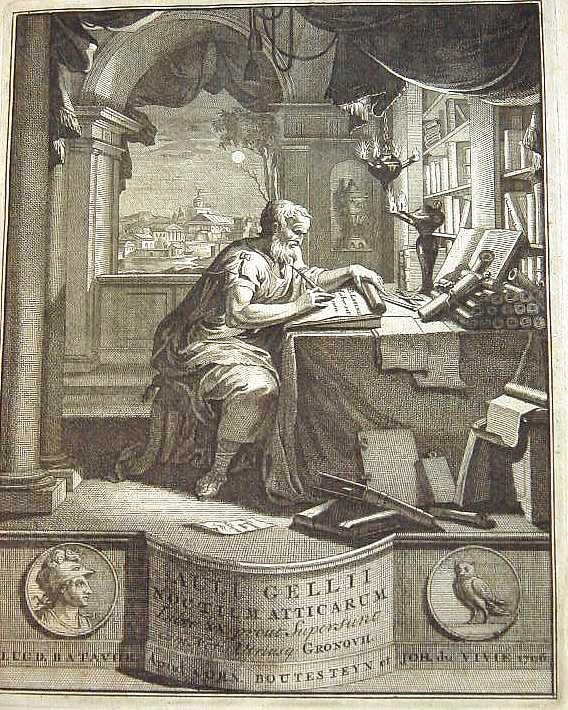First-century Roman Lararium from the House of the Vettii in Pompeii. © Patricio Lorente (CC BY-SA 2.5)
DOI.ORG/10.58214/TVWC3178
Professor Valentina Arena explains how ‘antiquarian’ Roman-era texts are profoundly innovative, politically engaged and culturally radical. Contrary to the assumption that the antiquarians operated in a detached world of scholarly endeavours, these authors were not only restorers, but also innovators of the world around them.

Valentina Arena is Professor of Ancient History at University College London, UK. Her work focuses on the history of Roman politics and ancient political thought as well as the wider intellectual landscape of the Roman Republic, with a particular interest in Roman oratory and antiquarianism. She is the author of Libertas and the Practice of Politics in the late Roman Republic and the editor of Liberty: an Ancient Concept for the Contemporary World. She has co-edited volumes on Varro and the antiquarian tradition (Varronian Moments, with F. Mac Góráin; Reconstructing the Republic: Varro and Imperial Authors, with Giorgio Piras) and is currently co-editing the first volume of the Cambridge History of Democracy. Valentina is currently the Principal Investigator of the ERC-funded research project Ordering, Constructing, Empowering: Fragments of the Roman Republican Antiquarians (FRRAnt)
how it all began
While researching a project on the transformation of the Roman Republic and the working of its constitutional arrangements, I came to analyse the works of writers often labelled as antiquarians, who dealt with the rules and regulations of Roman institutions and their religious framework. These works were united by a family resemblance in the way they approached the past: contrary to the chronological approach of narrative history writing, they were tied to a synchronic arrangement and appeared at first sight to collect all evidence for a given phenomenon indiscriminately without explicitly evaluating its relevance to a particular problem. By adopting a philological method, they moved from the present to reconstruct the past. Their subject matters concentrated on political institutions and laws, religion, private life and customs, topography, and language. They constituted a knowledge revolution that re-shaped the Roman intellectual horizon from the second century BC onwards and was understood until the 19th Century as a distinctive ‘antiquarian’ moment, hence the collective name of antiquarians that we give to those writers.
two major obstacles to overcome
There are two main problems any scholar has to face when dealing with the works of the antiquarians: first, their works are mainly preserved in a fragmentary state, through quotations in later authors, often in texts of a completely different nature, and second, later scholarship has tended to divide this material into subfields of knowledge such as, for example, grammar, law, history, and so obscuring its deeper continuities and undermining their collective contribution to the political and philosophical debate in ancient Rome.
the need for an edition
I realised that questions about the nature and the very essence of Roman antiquarianism – as well as its relation to later permutations of the phenomenon – cannot be properly addressed without gathering and editing the complete surviving evidence of this phenomenon according to rigorous philological criteria, to provide, for the first time, a complete collection and an exhaustive overview of those texts ascribed to this tradition. Such an edition will enable us to see more clearly those shared features and interests, which the early modern and modern applications of the term antiquarianism may have concealed, and the extent to which these family resemblances about approaching the past map onto and inspired subsequent understandings of this intellectual phenomenon.
the aim of our edition
My project, entitled Ordering, Constructing, Empowering: Fragments of the Roman Republican Antiquarians (FRRAnt) will radically transform our understanding of Roman Republican culture by firmly establishing a new textual and contextual framework for the elaboration of knowledge and the establishment of the religious and institutional system, and its Greek philosophical underpinnings, in the Republic. This, in turn, will have an enormous impact on the study of those later periods, which look back at Rome as a focal point of cultural reference.

Aeneas sacrificing to the Penates, on the outside of the Ara Pacis altar, Rome. ©Miguel Hermoso Cuesta (CC BY-SA 3.0)
Towards an understanding of Republican Antiquarianism
Considering the enormous – almost constitutive – influence of antiquarian studies over the course of early modern and modern cultural history, it is remarkable how little attention has been paid to the nature of these works in their original context of ancient Republican Rome. One of the most authoritative scholars in the field, Arnaldo Momigliano, in his study ‘Ancient History and the Antiquarian’ published in 1950, first established the field of antiquarian studies by referring to changes introduced by disciplinary knowledge and in relation to history. However, Momigliano’s brilliant essay has also tended to constrain subsequent scholarship. Building on the Saussurean distinction between the synchronic and the diachronic, Momigliano advocated that ancient antiquarianism was characterised by a distinctive interest in remote changes along a synchronic axis. However, this distinction is overstated, and created too sharp a dichotomy between history and antiquarianism, setting up the historian against the antiquary. As a result, two main consequences in the investigation of different ways of recording and narrating the past followed: first, a focus on the issue of the definition of antiquarianism vis-à-vis history; the second a disregard of the pivotal role played by philology in the development of antiquarian studies.
Not only did textual exegesis combine philology with an understanding of the history of religion, legal practices, and literary works, but also classical lexicography took precisely the form of the study of etymology. Whether investigating Roman history, language, family genealogy, jurisprudence, religious lore, or political procedure, antiquarian tools were historical research and etymology, a genealogical-reconstructive method which was substantially inductive and aimed to work back from the present to the past. By adopting a philological method, these antiquarians moved from the present to reconstruct the past, contributing directly to the formulation and establishment of the Late Roman Republican political institution and thought, which currently plays a large role not only in the field of historical studies, but also in contemporary political theory.
the project team and its working method
This project is funded by an ERC consolidator grant and based in the History Department at University College London, where I lead a team of international scholars who bring a wide breadth of knowledge and expertise, as well as a variety of approaches, to the research.
We are working to create the first systematic and comprehensive analysis of this antiquarian material, charting the dynamics of the intellectual, political, and religious spheres of the Roman Republic at the very moment of their creative mutual interdependence.
Starting directly from the ancient sources, the project is gathering, editing, interpreting and translating from Latin and Greek into English all the surviving evidence about the antiquarians of the Roman Republic. One of the main scopes of this project is a scholarly understanding of the wider phenomenon of Republican antiquarianism, which so far has been dominated to an unbalancing extent by the works of Varro, the antiquarian par excellence.
It follows that this edition will include, alongside Varro’s fragmentary antiquarian works: 1) the fragments (material which is, or is preserved as if it is, the actual antiquarian works of Republican writers); 2) the testimonia (material about work, its author, its content); and 3) and all the relevant but uncertain material dependent in some way on the author in question, of all Republican antiquarians, including all authors writing from the beginning down to the break out of the civil war.

Late 18th Century watercolour print of the Temple of Concord with group of figures playing instruments (British Museum) © Public Domain.
our printed edition
Wishing to establish an edition that is philological rigorous and historically transformative, this edition will present:
- a very substantial introduction, which will address the issue of genre and its Republican features;
- the complete surviving evidence for Republican Roman antiquarianism organised by individual authors (c. 90 individuals – besides major figures, such as, e.g., Aelius Stilo, Varro, Nigiudius Figulus, these will include authors, whose extant fragments mainly show an antiquarian approach, such as, for example, Iunius Gracchanus, Aurelius Opilius, and Valerius Messalla);
- an introductory essay for each author that contextualises his life and his work;
- a clear and consistent distinction between fragments (direct quotations), testimonia (which include indirect quotations and references or description of the argument), and pertinent discourse, which seems dependent in some way on the author in question but whose exact relation with the work remains unclear - whenever necessary, this will take a doxographical arrangement;
- an additional section of anonymous antiquarian material, arranged doxographically, and within each section chronologically (wherever possible);
- an agile apparatus criticus with the most important variants and conjectures for each fragment and testimonium (in some cases, with a fresh look at the manuscript traditions);
- translation for each fragment and testimonium as well as commentary with comparative passages from the same as well as other writers (including poets), that can elucidate the text and selected bibliography;
- comprehensive indices that make the material easily accessible.
The advantages of this design would be to enable the reader to distinguish consistently between what is certain and what is not, while knowing all the available evidence and what use has been made of them – as well as to engage with the texts and treat them as historical documents in their own right.
our database
The printed edition will be accompanied by an online database.
This electronic system is not only currently enabling the collection, sharing and querying of the research data by the project team, but will later be transformed into a database for external use. These data stored in the database will also be linked with pre-existing material, thus the database will contain a higher quantity of information pertaining to issues of both content and text than the printed edition. This would benefit in particular those researchers who are not interested in Republican antiquarianism per se, but rather in related fields.
The advantages of the online database will be to provide the users with the opportunity not only to access this material in translation, but also to order it as preferred, enabling them to break free from our editorial choices and arrange the material according to their personal judgment, so to explore more widely and freely the intellectual landscape of the Republic.
the rationale of this project
The rationale behind the structure of the project goes back to the heart of the research question. At an empirical level, it aims at establishing for the first time all the fragments as well as the testimonia about these works and providing us with the first overall picture of this phenomenon. At an analytical level, it will serve to challenge the current assumptions about antiquarianism, providing material to ask questions and to investigate the functions it fulfilled in its historical context.

Front piece to a 1706 Latin edition of Attic Nights by Jakob Gronovius. © Public Domain.
The wider aim: understanding Roman politics, religion, construction of knowledge and self-identity
By gathering, editing, interpreting and translating the complete surviving evidence about the antiquarians of the Republic and making widely accessible a body of critically significant texts that have never been seen in their entirety, my aim is not only to broaden the purview of scholarly debates on the construction of knowledge and the political and religious culture of the Republic, but also to transform our understanding of the intellectual life of the Roman Republic and fully explore its connections with the political and religious world of the time.
These authors, who, like Varro and Cicero, were also main actors of the political and military scene of the time, were elaborating a system of knowledge that was connected to their course of public actions.
Although they wrote down the rules concerning the institutional and religious working of the Republic in terms of continuity with the past, and validated responses to the changing needs of society on the basis of ancient precedent, this process was itself deeply innovative. In order to safeguard their special status as custodians of the past, these writers had to become ‘inventors’ of the knowledge which was the foundation of power-sharing in the Republic – and this was even more important at times when the political order was under stress. It follows that by doing so, these antiquarians contributed directly to the formulation and establishment of the Roman Republican ‘constitution.’ Without a full understanding of the development of this scholarly tradition, it will not be possible to trace down the history of Republican ‘constitutionalism’, which currently plays such a large role in the contemporary revival of ‘neo-Republican’ political theory.
Along similar lines, these scholars organised and systematised knowledge of religious matters. Part of a process of rationalisation, this writing established religion as a discourse to be analysed and critically discussed and in the process created for us an altered image of religious decay. In structuring religious knowledge, these authors presented the essence of Roman religion as built around the notion of orthopraxis, the correct practice of rites and rituals. It is only through a rigorous review of the antiquarian works that we will be able to understand better the articulations between, on the one hand, religious rituals and political institutions and, on the other, individual beliefs, whose centrality is now reclaimed in the most recent studies of Roman religion.
antiquarians as radical innovators
These writers were therefore profoundly innovative, politically engaged and culturally radical. The discovery of society through its language, and the link between the structuring of knowledge and the roots of power are profoundly modern concerns (it is sufficient to think about Foucault), and show how the world of knowledge is never neutral or objective, but rather enacted in all institutions of social encounters, and one of the engines that drives historical change. Contrary to the assumption that the antiquarians operated in a detached world of scholarly endeavours, these guardians of knowledge and traditions, as they styled themselves, were not only restorers, but also, and most of all, innovators of the world around them. In setting up their works as the object of enquiry, FRRAnt seeks to trace the ways in which these Republican Romans not only thought about their past, but also, and most importantly, constructed their present and laid the foundation for their future.
Once we acknowledge that these particular ways of ‘textualising knowledge’ were entwined with the religious and political practices as well as cultural developments of the time, these works can be recognised as much more than compilatory in form and conservative in aim. The collection and recording of their own tradition, the intensive use of what was seen as a new and productive philological methodology, the ordering and fixing of the mos maiorum (the accepted way of the ancestors) in texts, and the making of collective memories enacted as well as informed a process of Roman self-definition. With the intensification of the Roman relations with other cultures, the Romans found themselves needing to elaborate on their own identity. Imperialism required a dual process of appropriation of the other and comprehension of the self as foreigners, alongside the past, constituted an otherness that forced the Romans to learn about themselves.
By identifying and gathering all the surviving evidence for antiquarianism and demonstrating their transformative potential in the analytical components of the edition and related volumes, FRRAnt’s key contribution will be to explore how these antiquarian texts are intrinsically political as their lamentations about the decline of tradition, at the origins of study of the past, ultimately encouraged criticism of the present and therefore became a form of activism. Relying on scholarly research, where grammar and etymology played a central role, Roman antiquarianism developed a powerful discourse about the past. By selecting, ordering, at times even inventing, their traditions, these texts relocated the legitimising authority of the ancestors to a remote past, providing the present with much greater freedom to innovate.
the true ambition
FRRAnt will provide for the first time a research tool to investigate this phenomenon and will transcend the disciplinary boundaries of philology, ancient history, cultural studies, philosophy of language, legal and grammatical studies. It will bring a rigorous analysis of the texts and their manuscript tradition to bear on broader discussions on religion, identity, knowledge formation, philosophy of language, law, and political theory. Finally, it will enable a much deeper and clearer understanding of the totality of knowledge available at a foundational moment in history, and one which had a long and powerful impact on constructions of knowledge in later periods. FRRAnt’s true ambition is to launch the study of these texts as a major new departure for the study of ancient world and of classical tradition from the Renaissance onwards.














